
Mobilise for the Conf’ on June 17
Confédération Paysanne is mobilising to defend its right to peaceful direct action. Peter Crosskey explains. […]

Confédération Paysanne is mobilising to defend its right to peaceful direct action. Peter Crosskey explains. […]
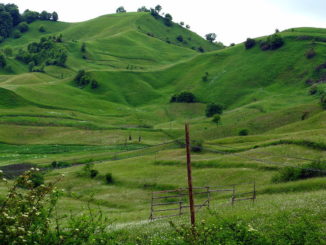
After Communism, there has been an understandable suspicion of co-ops in Romania. Nevertheless, there are some, and farmers are benefiting. […]

In the CAP reform deal agreed in June 2013, both Council and Parliament have supported greater flexibilities for implementing Pillar 1 new direct payment schemes. As a result for some, the CAP would seem to be less “common” and be more “à la carte”. However, since the 2003 reform had already introduced a phasing-in agenda for decoupled payments, CAP is already implemented through differentiated schemes among the MS. With the 2013 reform, many new schemes aiming at improving the direct aids targeting are mandatory (greening, young farmers) while other are facultative (i.e. optional) (coupled payments, payments for areas with natural constraints, small farmers scheme). Only their implementation modalities can be adjusted: upsizing or at the contrary downsizing the redistribution of CAP money among farmers according to national/regional priorities. Whether the CAP reform has been decided by 28 Member States (MS) and the European Parliament, it will been applied within 32 EU territorial constituencies. In the UK, regional jurisdictions will apply the CAP reform according to their distinctive boundaries in Northern Ireland, Scotland, Wales and England. […]
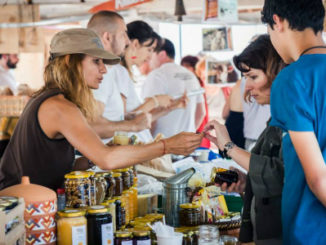
Another way to do food is possible. And its here. Friends of the Earth Europe’s “Eating from the Farm – the social, environmental, and economic benefits of local food systems” show us inspirational examples of where you can shake the hand that feeds you, all around Europe. This new publication explores the many myriad benefits of short food supply chains, and how they function in few countries in the EU. It “features five case studies which illustrate different ways in which communities are finding more sustainable ways to produce and consume food with benefits for all” FOEE say about the publication . They continue “The methods vary, but the outcomes are the same: control of the food system is being taken back by small-scale, sustainable farms and food enterprises from large-scale industrial businesses that dominate the market today putting profit ahead of well being for people and planet.” The milestone of more urban than rural dwellers reached globally as long ago as 2007. This, coupled with a the twin demands of the sustainable use of resources and […]

Guest post by David Cronin What is the real objective of the Trans-Atlantic Trade and Investment Partnership (TTIP)? We can get a good idea from watching a video recorded recently in Brussels. It features Cecilia Malmström, the European commissioner for trade, defending highly controversial plans to usher in a court system whereby corporations could sue against government decisions they do not like. According to Malmström, “companies need to have some sort of protection” against such issues as “nationalisation”. Intentional or not, that statement illustrates how the key negotiators of TTIP are in thrall to a right-wing ideology. The idea that certain economic activities could be nationalised – placed under public ownership – is anathema to them. TTIP would be a legally-binding accord effectively saying that capitalism is the only permissible system in the European Union and the United States. In the same video, Malmström insists she has “no secret agenda”. And to be fair, the Swede has been slightly more transparent than the EU’s previous trade chiefs. The irony is that the modicum of transparency she has […]
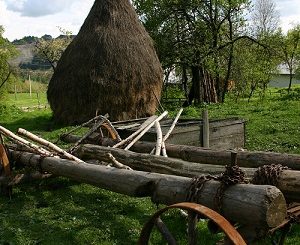
According to recent figures released by Eurostat, Romanian agriculture is highly unbalanced. That is not the big surprise. In the last 20 years the country’s agricultural landscape was in a continuous transformation; agrarian reforms without a long term vision, real estate and agribusiness “cowboys” from all over the world speculating on low prices, productions focusing mostly on export commodities…all in a country of peasants versus their institutional neighbours. The surprise lies in how different stakeholders interpret these figures. Let’s have a look. According to the EU analysis, Romania is the 8th agricultural power of Europe and for the year of 2014 has an agricultural production estimated to 15.5 billion Euro (1160 Euro/hectare). Poland was the only other ex-communist country which outranked Romania having a 22.5 billion Euro (1660 Euro/hectar) production. The top ranks go to France, with its 70.5 billion Euro and Germany – 51 billion Euro production. Where is the great unbalance? Crop production amounts for 73% of the total, 26% being attributed to animal farming and only 1% represents agricultural services. On the […]
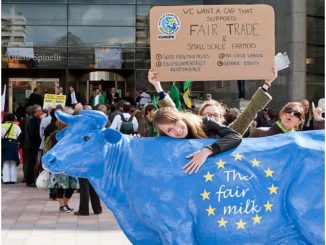
By Laetitia Nourry, Eco Ruralis intern on Food Chains Campaign 30 years after its setting up, the milk quota system is coming to its end. Europe is returning to unlimited production of milk where the benefits go to industrial farming. Another stab for the slowly disappearing peasant farmer. Milk quotas were set up in 1984 by the Common Agricultural Policy, to regulate the supply and demand and avoid prices collapse. So why lift them now? The reason is for economic. As milk consumption is increasing, especially in Asia (the demand of milk should double by 2022), the European Union definitely wants to keep its first place as milk exporter to the world. To reach this goal, one solution proposed by the EU leaders says that “farmers should be more aware of the market signal“. In other words, produce more milk, again and again, at the cheapest price. Hyper-production, exports, economic growth…but what is the price ? The end of quotas will indeed enrich big producers. Industrial farms will be able to produce milk in impressive […]


Analysing CAP expenditure provides a great opportunity for civil society organisations to assess whether CAP will really be, as was promised, greener and fairer. Here on CAPWatch, we will give you the facts and provide our own analysis. So CAPWatch will step behind the basic stats and the spin, and, using our own specially developed metrics, reveal just how fair and green CAP 2014-2020 is.[show-map id=’1′] For more details click on the member stateThe details used here will mainly be ex-post expenses, based on the financial reports provided by the European Commission and data provided by EuroStat. Expenditures are annually published by the European Union: this gives us the chance to make analyses and comparisons on a quantitative basis. This then allows for the calculation of very simple and useful indicators, such as percentages, monetary values of expenditure per Member State (MS), per hectare, for specific policy objectives etc.) to figure out the way CAP money is spent on land, per worker*, per value added and per rural development priority. These calculations will highlight the real weight of […]

Arc2020, Friends of the Earth Europe & IFOAM EU showcase 10 farming best practice case studies […]
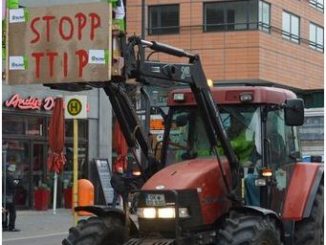
Karen Hansen-Kuhn & Hannes Lorenzen unpack the issues with TTIP & local food names in this long read. […]
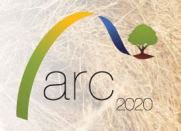
View this email in your browser Report: 50,000 take to the streets of Berlin to say: We Are Fed Up! This year’s “Wir haben es satt!” (We are fed up!) march surpassed even last year’s record attendance, with 50,000 people marching through the streets of Berlin. Their aim? To say no to a broken industrialised globalised food system and yes to an alternative. Find our extended report here. Coming up: Good Food Good Farming Conference Brussels – 10 and 11th FEBRUARY 2015 GOOD FOOD, GOOD FARMING CONFERENCE Renewing civil society’s agenda towards sustainable food and agriculture and a living countryside Who? ARC 2020 platform, Friends of the Earth Europe and the organic movement IFOAM, in collaboration with the European Economic and Social Committee invite you to a conference on the future of farming and food, on fair trade and sustainable rural policies. Why? This 1.5-days event brings together representatives from civil society, grassroots groups, researchers, national/regional authorities, policymakers and more to: 1. Assess the implementation of the reformed CAP 2014-2020, prospects of agricultural sustainability and of rural renaissance. 2. Identify milestones […]
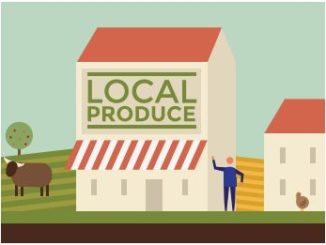
EU Citizens want local food but governments are not doing enough to help, Friends of the Earth Europe’s new report reveals. […]
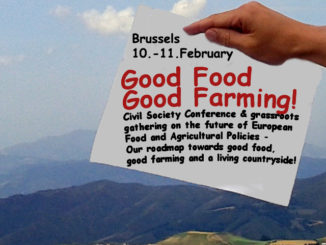
Civil Society and grassroots gathering in Brussels 10th – 11th February 2015 Register here. Follow the event live on twitter and facebook. The Agricultural and Rural Convention 2020 (ARC2020), Friends of the Earth Europe and IFOAM EU invite you to a civil society gathering and conference on February 10th and 11th 2015 in Brussels, hosted by the European Economic and Social Committee (EESC). This event brings together representatives from civil society, grassroots groups, researchers, national and regional authorities and policymakers to: 1. Assess the implementation of the reformed Common Agricultural Policy (CAP) 2014-2020 and its prospects of agricultural sustainability and of rural renaissance. 2. Identify milestones to support transition of food and agriculture systems based on agroecological approaches. You are invited to participate in the development of a Civil Society roadmap towards good food, good farming and a living countryside! Now is the time for the good food – goods farming movement in Europe to assess where we are, to develop a vision for where we want to be in 2020 and agree on a strategic roadmap how to […]

Soup&Talk and The Transatlantic – European workshop on TTIP after the “We are fed up!” demo 17.01.2015 in Berlin […]
Agricultural and Rural Convention